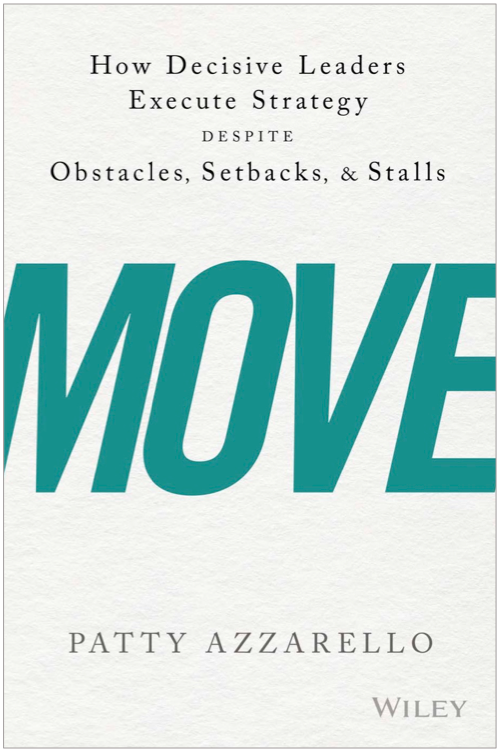Last week I wrote about being more strategic by giving yourself time to think — in fact, scheduling time to think.
And I emphasized the fact that if you don’t schedule it, it won’t happen.
But the reality is, even if you do schedule this time, it can still be hard to make it happen.
Dealing with interruptions
People often tell me that they try to schedule time to think, but then the time slot keeps getting over-scheduled or interrupted — so it doesn’t work.
What I want to talk about today is…
You need to make it work. It’s not automatic.
You need to give yourself permission to schedule this time, and then you really need to protect it.
Why is this hard?
SELF INFLICTED PRESSURE
I find that people imagine that others’ expectations of their constant availability is in reality, much less than the pressure people put on themselves to be always-on.
For example I was working with an organization where half of the people worked in the office and the other half at home.
They all used an instant messaging app to communicate throughout the day. The result of this was that…
…the people who worked at home were afraid to go to the bathroom!
They were worried that their peers would think they were not working if they didn’t answer every IM instantly.
This is crazy.
When I asked the office-based people, “What would you think if you sent an IM to your colleague at home and saw their status was marked as unavailable for a couple of hours?”
The unanimous answer was, “We’d think they were working on something important”.
We can build up this “expectation” in our own minds to be bigger than it really is, because it makes us feel important to be needed urgently.
I have seen countless situations where a person will make themselves available every minute for work, take calls on vacation, or even on their wedding day!
They’ll say, “Work is important, I’m very committed. I need to be available and responsive at all times.”
… And then they get laid off.
I’ve seen whole groups who have this culture of “super-responsive and overworked because it is so important” also get shut down or laid off.
Your company can absorb an unlimited amount of work from you and not really care.
You need to optimize
You need to take more control of your time not just to protect sanity, but so you can do an even BETTER job for your company.
As I said last week, if you react to everything, and do all the work as it comes in without thinking about it, you are not being strategic.
But if you give yourself time to think, you will be better at your job, add more business value, and become way more valuable to your company than if you are simply the tireless “super-responder”.
A few ways to protect your time:
1. HIDE
Schedule 2 hours for yourself to think and plan and work on strategic stuff, and then be physically out of sight. Work somewhere else in (or out) the building, because if you don’t…
…the activity will know where to find you.
Your thinking time will be taken over by urgent day-to-day interruptions.
What makes it difficult is that protecting this working time goes against the current way the company operates. There are working and cultural habits that don’t naturally support this.
2. Change expectations
People have specific expectations of you. Urgent things come up. People expect you to always be there and to be available at any minute. Or they just want to chat.
What you need to do is change those expectations with new habits. And that can be difficult…but maybe not as difficult as you think.
Begin small…Create one new habit…
Start with a single instance and let people know, “I need some focused working time to [solve a problem/finish something important/prepare for a client], so on Thursday I will be unavailable until 10am.
If you can’t hide, if someone tries to interrupt you before 10am, repeat this statement and say, you’ll get back to them to deal with their thing at 10am.
At first this might seem strange or off-putting, but people will get used to it. Try it again the following week.
You need to train people how to treat you.
They won’t give you this time if you don’t ask for it and manage their expectations, and also manage the dynamic of changing a habit.
But if you do, soon it will become a new expectation for people that on Thursdays from 8-10 you schedule working time, and it will no longer be so difficult or awkward to arrange it.
Make time to think or don’t
You only have 2 choices.
You will be able to come up with lots of reasons why this is hard to do, or why it won’t work. But you still only have 2 choices. Schedule it or don’t — It will not magically appear.
Schedule it and make your life better, or change nothing and stay in the current state.
It’s your choice.
By all means, if you want to work non-stop, that is also your choice. Just make sure you are choosing to work on things that have great value, not just equating value with being a very busy, hard worker.
And you’ll never figure out what has value if you don’t give yourself time to think about it.
No one will ask you do to this or specifically grant you permission. It’s one of the things that make the most successful people succeed is simply this — they give themselves quality time to think and protect it.
Patty Azzarello
Patty is available to speak at your company, annual meeting, or customer event. She can also deliver a custom workshop on Leadership or Strategy Execution for your leadership team. Contact Patty.
Or if you would like some personal help on your own professional development, check out her Executive Mentoring Group. It’s filled with insights, resources and support to build your executive confidence, advance your career, and includes direct mentoring from Patty.
MORE ABOUT PATTY:
Patty Azzarello is an executive, best-selling author, speaker and CEO/Business Advisor. She became the youngest general manager at HP at the age of 33, ran a billion dollar software business at 35 and became a CEO for the first time at 38 (all without turning into a self-centered, miserable jerk)




